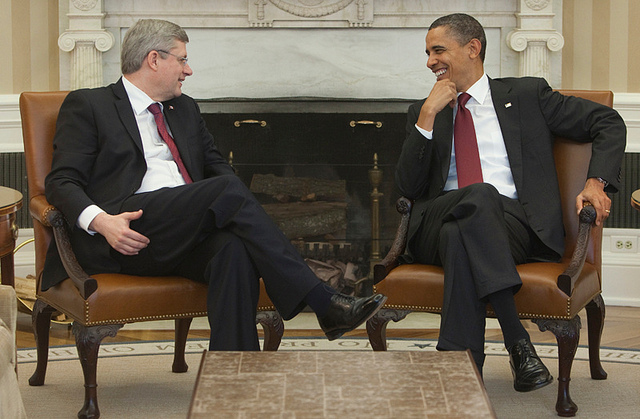Stephen Harper surprised and upset fans and adversaries alike when asked what he would do if the U.S. administration said no to the proposed Keystone XL pipeline. “You don’t take no for an answer,” replied Harper. Elaborating, the prime minister described himself as an optimist, and said he believed the case for approval was overwhelming.
Harper’s live television discussion with CNNBC reporter Maria Bartiromo was hosted by the Canadian American Business Council in New York. It took place during the opening session of the UN General Assembly, which the Conservative leader chose not to address.
On the surface it looked like the Canadian prime minister insulted the U.S. president, not long after snubbing the UN. Supporters of Keystone want the agreement approved by the U.S. administration, and have to wonder about the get-tough approach. Keystone crosses an international border, the U.S. State and the president have a veto, and could stop it.
In early September, CBC news reported Harper wrote Obama about Keystone, suggesting Canada would to commit to targets to reduce greenhouse gas emissions, and inviting Obama to discuss benchmarks that would satisfy his environmental concerns.
Activists gathered on Sunday in various places in Canada and the U.S. to protest TransCanada Corp and its Keystone XL pipeline project which would bring bitumen to the U.S. gulf coast for refining and for export, and increase the rate of exploitation of the Alberta resource to the point that it becomes a threat to controlling climate change at the global level.
The Keystone XL crosses six states, and is facing no opposition from governors of those states. When Gary Doer took up his post at the Canadian embassy in Washington, he brought with him a well-developed network of contacts in state houses across the American mid-West. Though the Canadian Ambassador is accredited to Washington, increasingly the embassy has been active in promoting Canadian projects at the state level and with civil society.
Republicans have been campaigning on behalf of Keystone, including Romney in his failed election campaign. If Obama does say no, there are mid-term elections in 2014 where Democrats can be attacked for turning it down, and a new presidential election cycle begins in 2016 where a Republican president (or a Democrat) could reverse a negative decision by Obama.
Few doubt the political influence pushing Keystone. The pipeline has the Fort McMurray, Alberta bitumen producers behind it, the who’s who of big oil, including significant American majors. Trans Canada Corp is under substantial foreign ownership, mainly U.S. Keystone is designed to ship and feed refineries owned by American majors. The refined petroleum will be sold to big oil customers around the world, and in the U.S.
Now private citizen Bob Rae described Canada as practicing megaphone diplomacy, leaving diplomats out of the loop, and ignoring traditional diplomacy.
During the tenure of Lester B. Pearson as first Undersecretary, then Secretary of State for External Affairs, and later Prime Minister, Canada practiced what was called “quiet diplomacy.” The world recognized the power of the U.S. president and Secretary of State; Canada was recognized for having access to the White House and the State Department; therefore Canada maximized its impact on world affairs by intervening quietly with the U.S. before policy was set. Other allies wishing influence would seek out Canada, recognizing successful access obtained by quiet diplomacy.
There has been much speculation about what Stephen Harper could have been thinking when he appeared to dismiss an Obama no. Was this belligerency brought on by prior knowledge of a no? Was he playing to Alberta interests, showing he was ready to fight on for Keystone regardless of a no? Was he sending a message to Canadian premiers that he would reject any no to pipelines, including those crossing B.C., Ontario, or Quebec, as Chantal Hébert suggested?
In fact, the Canadian prime minister resembled a Republican governor, sure he had his supporters on side, and having a little fun at the expense of a Democratic president for the benefit of the folks back home. In this respect, Harper was acting in character with his own political orientation — American Republican party — and expressing his view of Canada-U.S. relations: Canada as a part of a North American union, rather than an independent state dealing with a superpower.
Duncan Cameron is the president of rabble.ca and writes a weekly column on politics and current affairs.
Photo: pmwebphotos/flickr



